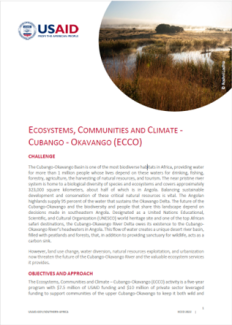September 2022 – September 2027
Total Funding: $7.5 million
OVERVIEW
The Cubango-Okavango Basin is one of the most biodiverse habitats in Africa, providing water for more than 1 million people whose lives depend on these waters for drinking, fishing, forestry, agriculture, the harvesting of natural resources, and tourism. The near pristine river system is home to a biological diversity of species and ecosystems and covers approximately 323,000 square kilometers, about half of which is in Angola. Balancing sustainable development and conservation of these critical natural resources is vital. The Angolan highlands supply 95 percent of the water that sustains the Okavango Delta. The future of the Cubango-Okavango and the biodiversity and people that share this landscape depend on decisions made in southeastern Angola. Designated as a United Nations Educational, Scientific, and Cultural Organization (UNESCO) world heritage site and one of the top African safari destinations, the Cubango-Okavango River Delta owes its existence to the Cubango-Okavango River’s headwaters in Angola. This flow of water creates a unique desert river basin, filled with peatlands and forests, that, in addition to providing sanctuary for wildlife, acts as a carbon sink.
However, land use change, water diversion, natural resources exploitation, and urbanization now threaten the future of the Cubango-Okavango River and the valuable ecosystem services it provides.
OBJECTIVES AND APPROACH
The Ecosystems, Communities and Climate – Cubango-Okavango (ECCO) activity is a five-year program with $7.5 million of USAID funding and $10 million of private sector leveraged funding to support communities of the upper Cubango-Okavango to keep it both wild and prosperous — where conservation protects the landscape's vital resources and improves human well-being.
The Nature Conservancy (TNC) leads implementation through a consortium of partners including local NGOs (Development Workshop, ADPP, and ACADIR), transboundary institutions including the Permanent Okavango River Basin Water Commission (OKACOM) and private sector companies (Gesto, BCP, CQuest Capital, Sun Africa, KixiCredito), to improve livelihoods and conserve biodiversity in Angola’s ecologically, hydrologically, and economically critical Upper Cubango-Okavango basin region. The objectives of ECCO are to:
1. Promote livelihoods biodiversity, forest and climate resilience.
2. Support community-led governance of water supply and sanitation services.
3. Strengthen cross-sector landscape collaboration for biodiversity and human well-being.
These efforts upstream will help sustain the Cubango-Okavango Basin and its unique natural values, improve people's lives, and foster vibrant and sustainable economies in Angola, Namibia, and Botswana. This activity directly supports the Defending Economic Livelihoods and Threatened Animals Act of 2018, which calls on the U.S. to engage with a wide range of partners to support inclusive economic growth through conservation and biodiversity programs that facilitate transboundary cooperation, improve water and natural resource management, and build local capacity to protect and preserve threatened wildlife species in the greater Cubango-Okavango River Basin and neighboring watersheds and conservation areas.
EXPECTED RESULTS
- Communities empowered to plan, manage, govern, and monitor their resources effectively
- Communities have the skills, knowledge, and partnerships to develop and implement community-led conservation-based enterprises such as sustainable fisheries and community cooperatives that increase economic opportunities and reduce threats to biodiversity
- Improved access to sustainable water supply, sanitation and clean energy
- Improved protection of biodiversity and ecosystem services including carbon sequestration
- Increased inclusive livelihoods opportunities targeting women and marginalized populations

